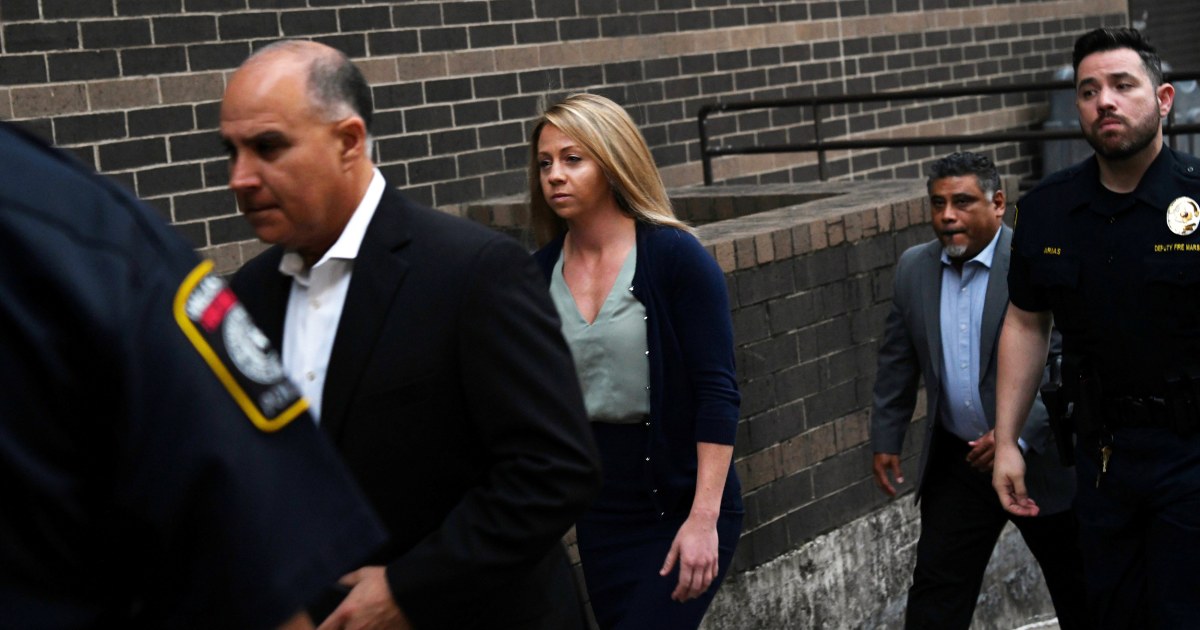People with extreme ignorance really shouldn’t be trying to exercise the utmost of prejudice.
Suuure, buddy.
Try to put up a more convincing show of your indignation and concern in all these other threads, too.
So the good ones that wouldn’t do this - did they all have the day off - or have they arrested any of these murders here on day 12 since the attack ?
Let me know when the good ones put an end to this death squad.
Unless they are too busy rounding up Epstines clients now that they aren’t chaining up businesses.
1. Firings are low - key
2. Previous records on job performance are hidden or simply ignored
3. The “good ole boy”
culture - yes, it's a CULTURE
4. Protectionism
5. Absence of any true consequences
6. System allows garbage to percolate very well, see below
In any other profession - any egregious act tarnishing image of said profession gets you disbarred.
Not for them.
I suppose it’s the same way we’re hesitant to call out slob “gun owners,” as they’re “one of us.”

Following a comprehensive investigation, the Justice Department announced today that the City of Lexington, Mississippi (City), and Lexington Police Department (LPD) engage in a pattern or practice of conduct that deprives people of their rights under the U.S. Constitution and federal law...

www.justice.gov
I was there for half a year, during this period.
How Brookside, Ala., used its police force to bank income, destroy lives and build an empire. And how it came to an ignominious end.

www.al.com
No shortage of these discussions, almost too easy to find - sometimes feels like it's a contest.
Stories of these kindsa things are legion in the Arkansas / Mississippi / Alabama area. Very likely to be the same in the neighboring states as well. Do go on and whitewash, minimize, or just outright deny it 
There’s oftentimes a “better them than no one at all” attitude towards it (from those who are not under the boot, of course).
Tell me if you haven't heard of this conversation - "
...you got a ticket? That guy's a friend of Zach's. He can take care of it for you."
Most instances don’t make it to the news - why would they? They’re part of daily life, like acne and obesity and flatulence and diabetes and dementia.
I suppose it’s an issue in Texas as well, from a link below on this very page - going by the popular stereotype of the corrupt overweight Sheriff and mentally deficient deputy

ARTICLE
The Wandering Officer
Ben Grunwald & John Rappaport
POLICING
https://www.yalelawjournal.org/article/the-wandering-officer
ABSTRACT
. “Wandering officers” are law-enforcement officers fired by one department, sometimes for serious misconduct, who then find work at another agency. Policing experts hold disparate views about the extent and character of the wandering-officer phenomenon. Some insist that wandering officers are everywhere—possibly increasingly so—and that they’re dangerous. Others, however, maintain that critics cherry-pick rare and egregious anecdotes that distort broader realities. In the absence of systematic data, we simply do not know how common wandering officers are or how much of a threat they pose, nor can we know whether and how to address the issue through policy reform.
In this Article, we conduct the first systematic investigation of wandering officers and possibly the largest quantitative study of police misconduct of any kind. We introduce a novel data set of all 98,000 full-time law-enforcement officers employed by almost 500 different agencies in the State of Florida over a thirty-year period. We report three principal findings. First, in any given year during our study, an average of just under 1,100 officers who were previously fired—three percent of all officers in the State—worked for Florida agencies. Second, officers who were fired from their last job seem to face difficulty finding work. When they do, it takes them a long time, and they tend to move to smaller agencies with fewer resources in areas with slightly larger communities of color. Interestingly, though, this pattern does not hold for officers who were fired earlier in their careers. Third, wandering officers are more likely than both officers hired as rookies and those hired as veterans who have never been fired to be fired from their next job or to receive a complaint for a “moral character violation.” Although we cannot determine the precise reasons for the firings, these results suggest that wandering officers may pose serious risks, particularly given how difficult it is to fire a police officer. We consider several plausible explanations for why departments nonetheless hire wandering officers and suggest potential policy responses to each.
AUTHOR. Ben Grunwald is Assistant Professor, Duke University School of Law. John Rappaport is Assistant Professor and Ludwig and Hilde Wolf Research Scholar, University of Chicago Law School. The authors thank Guangya Liu at Duke and Morgen Miller, Rafeh Qureshi, and Bartosz Woda in the Coase-Sandor Institute at the University of Chicago Law School for help constructing the data set; Dhammika Dharmapala and Richard McAdams for generously sharing data; Matt Adler, Will Baude, Panka Bencsik, Sam Buell, Mitch Downey, John de Figueredo, Michael Frakes, Barry Friedman, Brandon Garrett, Roger Goldman, Hiba Hafiz, Emma Kaufman, Kate Levine, Darrell Miller, Richard Myers, Michael Pollack, Kyle Rozema, Seth Stoughton, and Samuel Walker for feedback and suggestions; Dylan Demello, Carly Gibbs, Morgan Gehrls, Viraj Paul, and Catherine Prater for research assistance; and Terry Baker at the Florida Department of Law Enforcement for assistance interpreting the data. The paper also benefited from presentations at Duke University School of Law, Gonzaga University School of Law, the American Society of Criminology Annual Conference, the Law and Society Association Conference, the Criminal Law Roundtable at UNC School of Law, the Junior Faculty Forum at Richmond School of Law, the Stockholm Criminology Symposium, the ETH Zurich Conference on Data Science and Law, the European University Institute for the Rule of Law, and the Law of the Police Conference. John Rappaport acknowledges The Darelyn A. & Richard C. Reed Memorial Fund for financial support.






